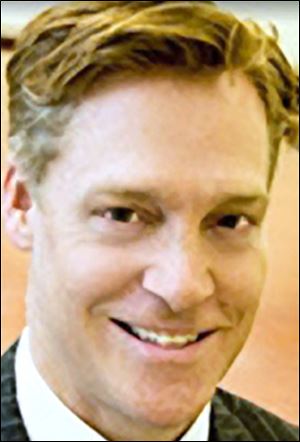
Health-care changes lurk
Federal budget trims needed, consultant says in Toledo
2/8/2012
Bradford Koles, Jr.
Health-care changes are under way no matter what happens with federal reform, either as a result of the presidential election or challenge before the U.S. Supreme Court, a national health-care economist and Toledo native says.
And as the number of baby boomers turning 65 grows -- joining the ranks of Medicare beneficiaries along with the likes of Donald Trump, Sylvester Stallone, and Cher -- something has to be done to trim the federal health-care budget, said Bradford Koles, Jr., executive director of the Advisory Board Company, a publicly traded research firm in Washington.
About 7,000 Americans daily are turning 65 and becoming Medicare beneficiaries, and the number will grow to 10,000 a day before scaling back, Mr. Koles told a gathering at the Toledo Museum of Art's Glass Pavilion. "Maybe health-care reform will be overturned -- that could happen," he said. "But we can't overturn the baby boomers."
Mr. Koles was the keynote speaker for a breakfast meeting called by Andrea Price, Mercy's president and chief executive, to look at the impact of health-care issues on northwest Ohio. Roughly 125 business and community leaders attended the meeting, which grew out of a series of smaller health-care discussions Ms. Price held with groups of them last year.
Some people in those groups had indicated they wanted more information about health-care reform, and both large meetings like Tuesday's breakfast and smaller gatherings will continue to keep discussions going, Ms. Price said.
The future of the health-care industry is unknown, but Mercy is not idling, Ms. Price said. The executive talked about Mercy's strides related to reform in areas including use of electronic health records, which recently earned the hospital system a $9 million payment from the federal government.
"Exploring its future and its possibilities really inspires me," Ms. Price said of health care, adding, "We are focused."
The health-care industry, Mr. Koles said, quite simply will be on a budget for the next decade.
Medicare funding certainly is an issue as hospital systems such as Mercy face tightened reimbursements, Mr. Koles said. States are cutting back on Medicaid too, and commercial insurance payments will not be as lucrative and able to subsidize some of the shortfalls of government insurance programs, he said.
Patients, meanwhile, will have to cover more of their health-care costs in commercial plans, and perhaps even face buying their own policies, aided by monthly stipends from employers, Mr. Koles said.
Much about health care could change within a year with the presidential election and the case before the Supreme Court challenging whether all Americans must have health insurance by 2014 or pay penalties, along with other issues, Mr. Koles said.
Although jobs and the sluggish economy have taken top priority during the presidential election year, the federal deficit and funding for health-care and defense are integral topics, he said.
"On the surface, the debate isn't about health care," Mr. Koles said. "But just below the surface, it is."
Contact Julie M. McKinnon at: jmckinnon@theblade.com or 419-724-6087.